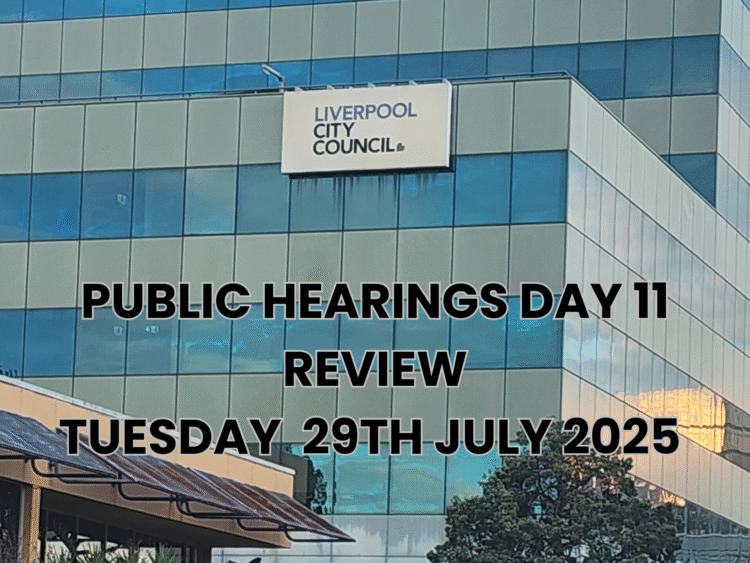Mr Ajaka’s testimony on Day 11 centered on his early days as CEO of Liverpool City Council, starting in December 2022, focusing on his interactions with senior directors, terminations with ex gratia payments, and his efforts to address a toxic workplace environment.
Mr Ajaka discussed his approach to the existing directors when he commenced as CEO. In December 2022, shortly after starting, he met with all five directors collectively and then individually to outline his operational vision and assess their willingness to be part of his team. He offered each director the option to leave with a termination agreement involving an ex gratia payment (an amount less than full contractual entitlements, though specifics were withheld due to a non-disclosure agreement). Three directors—David Smith (Planning and Compliance), Peter Diplas (former Acting CEO who returned to a director role), and Paul Perrett—accepted the offer and had their employment terminated on 30 December 2022. A fourth director, Raj Autar (Infrastructure and Environment), initially declined but later, on 3 February 2023, opted to leave under the same terms after personal reflection. The fifth director, Tina Bono, chose to stay.
For Liverpool ratepayers, the decision to offer ex gratia payments to departing directors raises significant concerns. As Mr Ajaka acknowledged, these payments incurred additional costs beyond contractual obligations, directly impacting our rates. While his intent was to ensure a committed team, the financial burden of these payouts—especially for someone like Raj Autar, whom Ajaka described as exemplary—means less money for community services or infrastructure projects . This approach, though aimed at cultural reform, places an unnecessary strain on our budget, especially when legal contract terminations without extra payments were an option.
During his testimony, Mr Ajaka revealed that prior to his discussions with the directors, Mayor Ned Mannoun had highlighted dysfunction within the council, even before Ajaka applied for the CEO role. The Mayor specifically named David Smith and Peter Diplas, expressing concerns about the Planning Department under Smith, citing serious delays in Development Applications (DAs), long waiting lists, and a belief that Smith was not up to the job. While Ajaka did not relay these specific criticisms to Smith during their meeting, this prior input from the Mayor likely shaped the context of his approach to the directors.
As ratepayers, the involvement of Mayor Mannoun in identifying specific directors for concern before Ajaka’s tenure begins raises questions about political influence over staffing decisions. While Ajaka framed his offers as open to all directors to ensure team cohesion, the Mayor’s preemptive focus on certain individuals suggests that personal or political agendas could have played a role in who was encouraged to leave. For us, this risks undermining impartial governance, potentially prioritizing political alignment over merit, which could affect the quality of leadership managing our rates and services
Mr Ajaka emphasized his goal to eliminate a “toxic” environment at the council, a view formed from early discussions with staff and the United Services Union (USU) delegates within his first week. He described toxicity as an “us versus them” mentality among staff and directors, aiming to foster a unified team. His strategy of offering terminations was rooted in a belief that directors must both be capable and want to be there, asserting that without both, effective collaboration was impossible. He had no personal concerns about the directors’ performance at that stage beyond the Mayor’s input, but prioritized willingness to stay and work together to halt the toxic culture.
Area of Concern for Residents: Impact of Workplace Culture on Service Delivery
For Liverpool residents, the acknowledgment of a toxic workplace within the council is deeply troubling. Internal discord and dysfunction, as described by Ajaka, likely contributed to inefficiencies or delays in critical areas like planning (noted by the Mayor’s concerns over DAs), directly affecting our community—whether through stalled developments or poor service delivery. While Ajaka’s intent to rebuild a cohesive team is commendable, the cost of achieving this through ex gratia payments and potential loss of experienced staff could set back progress on local priorities, with our rates footing the bill for cultural overhaul rather than tangible improvements.
As ratepayers in Liverpool, Day 11’s testimony from Mr John Ajaka highlights serious issues with financial stewardship and workplace culture at our council. The decision to offer ex gratia payments for director terminations, while aimed at fostering a unified team, places an additional financial load on us. These funds, drawn from our rates, could have been allocated to essential services or infrastructure across our suburbs, rather than covering discretionary payouts, especially for capable staff like Raj Autar.
Equally concerning is the potential for political influence in staffing decisions, as suggested by Mayor Mannoun’s prior identification of specific directors. For us, this raises doubts about whether council leadership serves our interests or aligns with political motives, risking the impartial management of our $530 million budget. Moreover, the toxic environment Ajaka sought to address likely impacted service delivery, meaning our rates may not have yielded the efficiency or outcomes we expect. We deserve a council where decisions prioritize community benefit over internal or political dynamics.
Transcript Day 11 English



























